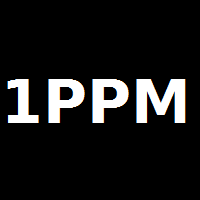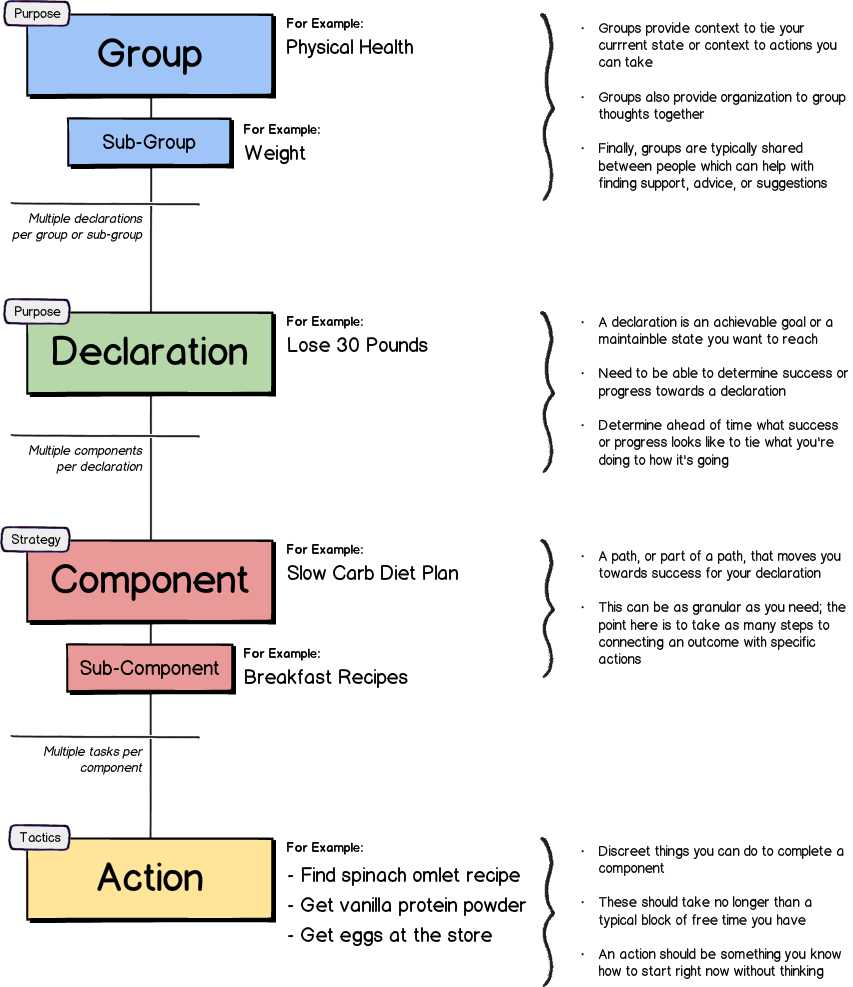After years of reading about productivity (a generally unproductive thing to do), trying out different techniques and apps, and journaling, I have finally constructed a system that helps me complete concrete tasks consistently and efficiently. The navel-gazing process of describing it here would probably put you to sleep so, for context, I use a combination of Asana, Post-It notes, nvAlt, text messages processed by IFTTT, and a single pile of papers.
I’ve tried no less than 40 different to-do/organization/task apps over the years and found that getting stuff done is simple combination of keeping my queue full but not too full, setting priority, and finding time to focus on that queue. For me, it’s not any more complicated than that and the more work I do to structure these atomic tasks, the more work I have. Record, prioritize, complete, repeat.
Still, I have a major problem with getting particular set of things done.
I’ve have trouble keeping track of all the things I want to do for myself and my family to grow as individuals and as a group. These are things like getting more exercise, finding fun things to do together, learning how to work with wood, getting back into homebrewing, learning or re-learning a language, and so on.
Unlike concrete life tasks – clean the bathroom, pay that bill, pick up this thing, code that widget – there is no distinct starting point, making it hard to begin progressing towards a desired outcome. How do you begin to “get more exercise?” You start exercising, right? Well, I’ve been trying to exercise more for a decade and it’s clear that it’s just not that simple. Maybe I need to join a gym or find a good spin class or buy some equipment for the house. There is a trigger out there that will help me do this beyond fits and starts and I have not found it yet.
Another thing that makes these “tasks” difficult is the lack of an ending point. There is no achievement, just productive work towards an acceptable state of being. If I want to lose weight, maybe there is a goal weight that I want to hit but, once I’m there, the journey isn’t over. I will, of course, want to maintain this svelte, sexy new me so I have a new thing to concentrate on: don’t gain it back. Maybe my goal is to keep the weight off for a year but, after that time, I’m back where I started with nothing concrete to work towards.
Neither of those two attributes compare to the most de-motivating factor of them all, though: these nebulous, hard-to-start, never-ending states of being don’t actually have to get done, ever. I’d like to lose 30 pounds and I’d like to fix my back and I’d like to have a creative, productive hobby but if I never figure out how to do that then life continues as it has been and life ain’t so bad. No one is holding my feet to the fire but myself and the reward is an incrementally better life. If I’m at least moderately happy and comfortable, I can wallow in that satisfaction and my dreams of really being the best person I can be fall by the wayside.
Welcome to my 30’s.
Maybe 6 months ago, in one of my typical “ack, things have to change” moments, I followed the rabbit-hole of self help blog posts to an exercise that resonated with me immediately. You sit down with zero distractions for 20 minutes and try to write down 100 things you want to do in your life:
Write down 100 things you want to do. Or careers you want to have. Or people you would like to meet. The sky is the limit. Don’t be realistic. Dream big. Write down the craziest things you can think of, as well as the things that you don’t even think bear mentioning because they are so simple. Write it all down.
It sounded like fun so I did it and it was. I got about 49 down before I ran out of steam. A few highlights:
- Build a bike from “scratch”
- Eat pho in Vietnam
- Learn Spanish
- Compete in a BBQ competition
- Brew a beer that’s in my top 10
What I got was a list that told me “hey, there’s a lot of things you want to do with your life.” Doing some quick math, it occurred to me that I have enough life left to accomplish everything on that list if I really put myself into it. It also occurred to me that this would be an easy exercise to do, be inspired by, and then think about again in a year and beat myself up for not doing anything towards these goals, all the while living a nice, comfortable, fulfilling life by my own standards.
And that, in short, is the main problem. I have a hundred things I want to do or accomplish or change or improve in my life but the inevitable pain of regret down the road never seems to be enough to motivate me to act. I have times where I can and do make progress but, most of the time, I forget that life is a marathon and not a race and just watch directly in front of me, trying not to twist my ankle on a rock.
Almost 2 years ago, I was having a different kind of “ack, things have to change” moment. I was overwhelmed with the number of things I had going at once and making little progress towards web side projects that were important – at least in my mind – professionally and personally. Every time I sat down with some “free time” to push a big rock forward, I would find myself paralyzed and, in no time, working – or “working” – on something unimportant. It struck me that this was a familiar state and was doing more than just stymying progress, it was bumming me out.
This is where I start to stress out. I’ve got time left today to work on it but I’m paralyzed. All these huge pieces looming, hundreds of hours of work in total. Where do I start? What do I do? The anxiety builds and I find myself reading online articles about productivity and finding some useless task to fill my time. Where is my direction? What happened to the plan? I’m nervous and irritable, the plan is causing stress and distraction rather than clarity. What am I doing wrong? [link below]
So I sat down with a glass of bourbon (in a wingback leather chair in my library next to a crackling fire during a thunderstorm outside my castle) and set out to solve this problem for good. I wrote as I organized and came up with a thought process that I’ve used over and over to great success (insofar as I have a path forward when things get murky).
The take-away, if one intolerably long post from me is all you can handle today, is thinking through discreet projects strategically down to where you’re able to approach tactics. Then you mentally switch hats and write the concrete tasks towards one single strategy. Order those tasks and you’re ready to roll. What I found during this exercise is that I was conflating big-picture thinking with to-do lists and was leaving myself lost and with nowhere to start. I was also rapidly switching between strategy and tactics, over and over, and losing the reason behind the actions. Additionally, I found that a lot of the tasks I had written down previously were either out-of-date or unhelpful and, when the time came to do them, I was finding myself asking why I wanted to do it in the first place.
This was, for me, both a revelation and a relief. I had a no-guilt explanation for my lack of effort and I had a way to address these thoughts when I inevitably confront them again. If I’m stuck, I decide where I’m at mentally – am I in brainstorming, idea-making, pie-in-the-sky mode or am I in head-down, music on, GTD mode – and act accordingly. The checks and balances for spending too much time in one mode or the other are automatic: too much time in strategic mode means nothing is actually getting done and I find myself asking why; too much time in tactical mode means I’m losing site of the goal and feel waning motivation.
Problem “solved.”
Putting this all together paints a pretty clear picture in 4 bullet points:
- I have no problem getting things done
- I have no problem figuring out what I want to get done
- I have no problem connecting those two at work
- I am still 30 pounds overweight, my back still hurts, and I still have the mechanical skills of a 3 year old
Shit.
In a moment of busywork while trying to keep my daughter from destroying the house, I stumbled on the list of “100” things I wrote and scrolled through them quickly. The first thing I felt was joy as I read through these not-impossible things I came up with just months before. I want to go back to Paris and have a conversation with Ira Glass (not necessarily in Paris but I’ll take it however I can get it). I want to write a hip-hop track and make the beat for it. I want to build a dining room table and a shop bench and cabinets for the garage. I want to do the STP again, see Scotland, and write a blog post that 100,000 people read. I was immediately struck with possibility.
As soon as the joy and wonder started to fade into the familiar self-doubt and pessimism, I thought of my strategy versus tactics system. If I’ve been more productive and less self-deprecating using that at work, why couldn’t I use those lessons to achieve what I want personally? The reasoning is sound: I’m dealing with big-picture, hard-to-start stuff that doesn’t need to happen but all things that I’m capable of doing.
But the situation is different in a number of ways:
- For me, a list of things I want to accomplish personally is not stress-inducing. Thinking about doing all these wonderful things fills me with joy rather than anxiety.
- There isn’t any sense of priority. If I make it to Paris in 2016 and meet Ira Glass in 2017, that’s just as excellent as the other way around. With work tasks, one thing might be more timely than another or might be a blocker to something else.
- There is even less of a sense that I “have to” do these things. Not working efficiently means less income but not knocking off bucket-list items just means a less full life
- If I worked every waking hour for a year and tackled every single strategy and tactic I could come up with at work, I’d be a mush of a person – very unhealthy and probably completely unfulfilled. If, however, I won the Powerball and could focus on the personal list every waking hour, I’d be invigorated.
The key, then, is not to map my work system onto my personal life and claim victory, the key is to take what I’ve learned so far and treat this as a different problem to solve.
So what have I learned from my work system that seems applicable to a personal one?
- I find myself in various states from day-to-day, even hour-to-hour sometimes. If I’ve had a long work week, the idea of sitting in front of a computer and learning, say, a new web development skill sounds awful. But going for a walk (progress towards fitness or weight), calling someone I’m close to but haven’t chatted with in a while (personal growth or community building), or running to the hardware store (creative, productive hobby) might be just the thing.
- As you can see from the previous bullet, the act of defining tasks is still important. If I want to travel to France, the main blocker is finding the time and the money. But some of the tasks involved might be picking an area or a hotel, pricing out tickets, blocking off time on the calendar, getting my wife to request the time off work, etc. What if I started planning that trip now, time and money unknown? I would say that it gets me closer to making it happen and has the added benefit of reminding me of how I want to spend my money next time I’m pricing out a new computer.
- If I locked myself in a hotel room for 2 nights and worked through strategy and tasks for a hundred things I want to do in the next 2 decades and then referred back to that list every day/week/month, I would be frozen with inaction. Each item could generate, say, 4 – 8 different tasks, leaving me with 400 – 800 new things to do now. Barf. The insurmountable “wall of work” would be crippling.
Put simply: My context will determine what types of things I am likely to find easy to do and a limited, ordered list of those things will remove wasteful decision-making time.
Maybe you’ve read through all this and thought “this sounds like me and I’ve had the same issues” and wondering when I’m going to get to the part where I solve your problems. I hope that is this section.
In the end, what I want is a structured way of approaching this kind of problem that I can try, document, and either succeed or fail. If I succeed, then I can continue, If I fail then I learn a number of things that don’t work and can iterate on that. This is, loosely, the scientific process applied to personal development. In the end, I’m not tied to my hypothesis about what will work, nor do I really care what method works. What I want is to solve the problem of “how do I keep myself focused on living a more fun, full life.”
Several pages of printer paper, a stick of mechanical pencil lead, and half an eraser later, I have a hypothesis to test.
- Groups (or “Categories”): Organization for the declarations I make
- Declarations (or “Goals” or “Statements”): The goals or states I want to achieve (the 100 things above)
- Components (or “Paths” or “Ways”): The ways to achieve my declarations
- Actions (or “Tasks”): Specific, known things I can do to move me along a path towards my goal or state
Here is a bit more color, literally and figuratively:
< 2020-11-29 >
I put this post live today because it's been sitting as an unfinished draft for over 3 years. There is probably not a lot of value someone else could take from this post but, for me, it's another signpost in figuring out how my brain works. This is still when I believed the only thing keeping me from getting exactly what I want out of life is a better todo list. I'm still not sure exactly what it will take for me to get there but my thinking has advanced a bit from here.
< Take Action >
Comment via:
Subscribe via:
< Read More >
Tags
Newer

Feb 07, 2017
1PPM: month 1 (and 2)
I found a group of folks online who committed to launching 1 project per month (1PPM) and it resonated with me in a big way. This is what I did for my first one.
Older

Jan 05, 2017
Engineer Support for Content and Communication Rockstars
Regardless of the industry, when people care deeply about what they're making and who they're helping, it shows.
